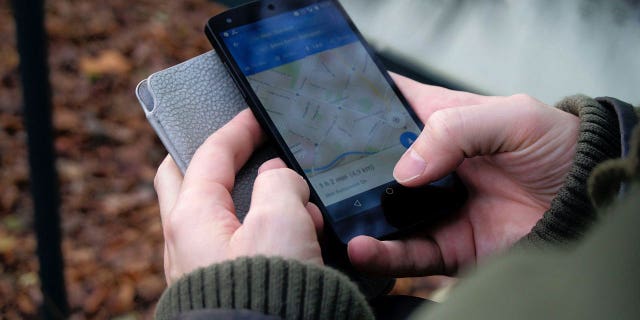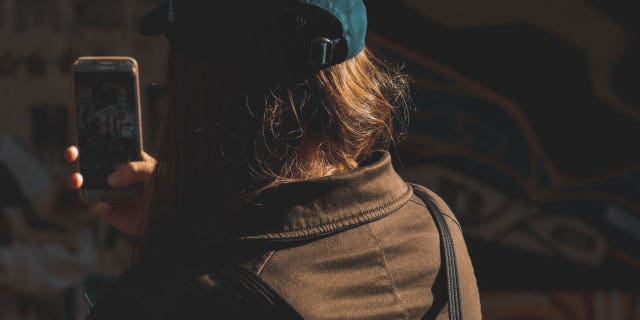Many would agree that the fact that almost all smartphones come with GPS services installed is one of their many benefits. For one thing, while traveling to or in a city you might be unfamiliar with, you have an instant map at your fingertips, making getting lost nearly impossible.
Then too, thanks to apps such as "Find My Phone", the built-in GPS service could save you the trouble of turning your home inside out while looking for your missing phone.
With all this in mind, however, the GPS software which can help you from getting lost might also help others pinpoint your location.

Here's what to know about location software on your phone.
(Fox News)
"Find my" apps could save your life
Of course, the Find My Phone app and other GPS software were not designed to put iPhone or Android users in danger. Quite the opposite, the iPhone 14 comes with an Emergency SOS service, free for the first two years of usage.
When SOS is accessed, no matter where you are in the world, it will contact emergency services via satellite in locations where there is no Wi-Fi or cellular service. Of course, in areas covered by foliage or without other elements blocking the sky, reaching a satellite might not be possible.
But with a clear shot of the sky, the SOS service does indeed have lifesaving potential, as evidenced to be the first-ever rescue mission as a result of this service, recently Reported by the Alaska Department of Public Safety, when a man traveling via snowmobile became stranded.
Thanks to the SOS service, he was able to contact the Apple Emergency Response Center via satellite, which in turn could provide the Alaska state troopers with the man's GPS coordinates.
The man was saved and free from harm, all thanks to the miracle of technology.
HOW TO KNOW IF YOUR IPHONE IS LISTENING TO YOU
Police can help find your phone...for better or worse
Another recent example of law enforcement using the "find my" app resulted in a much less happy ending, as revealed by a recent litigation (use link: https://www.aclu-co.org/sites/default/files/wysiwyg/complaint_and_jury_demand_12-01-2022_redacted.pdf ) filed in county court claims in Colorado a couple of weeks ago.
The Denver Police Department was on the hunt for a stolen truck, which was carrying $4,000 in cash, multiple guns, and two drones, as well as the truck driver's iPhone. Understandably, the police had the intuition to use the "Find My" app to locate the phone and hopefully the perpetrators.
They were able to find a location, which turned out to be the home of retired postal worker Ruby Johnson, who was temporarily apprehended while the police searched her home for the missing phone.
While the missing phone was never located, a screenshot from the Find My app showed that the iPhone was in the general vicinity of Johnson's home, not her exact address. Alas, the phone, not to mention the stolen truck and ammunition were never found, and Johnson, with the help of the American Civil Liberties Union, is suing the detective in the Denver Police Department for unspecified damages.
4 COMMON THINGS ALEXA CAN DO BETTER THAN YOU
Use caution when downloading new apps
It's hardly the first time the location services on someone's phone might have gotten someone in a precarious, if not downright dangerous position. Namely, because people tend to approve all apps to know your location at the simple click of a button.
While we should always do just that for navigational apps, we might want to think twice about allowing our location to others, as spyware software intentionally designed to track and follow you around is on the rise.
Even allowing our location to be available at all times on social media might be a mistake, as it opens up the potential to allow just about anyone to track you down.
There are a few simple steps people with an iPhone can take to make sure that your location won't be readily available for all to see.
UNWANTED EMAILS FLOODING YOUR INBOX? HERE'S WHAT YOU CAN DO

Use these tips on adjusting your privacy protections while using location software.
(Fox News)
How to adjust which iPhone apps track you?
follow these steps
- Click on Settings
- Click on Privacy & Security
- Click on Location services.
It is here where you will see all the apps you are currently sharing your location with and are greeted with a few options when it comes to tracking which are:
- always
- While Using
- Ask Next Time
- Never.
Which apps should I allow to track my location?
This is of course a matter of personal opinion, but generally speaking, the only apps where your location being known is necessary are:
- Find My Apps
- Navigational Apps
- Ride Share Apps
- To install Food Delivery Apps.
And even so, it's probably only wise to have location services on "while using".
Apps to avoid allowing location
HOW TO CHECK IF SOMEONE IS STEALING YOUR WI-FI AND WHAT TO DO ABOUT IT
You can never be too sure who may be watching you.
One can never be too sure exactly who is on the receiving end of your current location while using an app, as evidenced by a "precise location" warning from Twitter and Instagram. While the situation proved not to be as serious as suggested, it was still a sobering reminder of how frighteningly easy it is for hackers to find your precise location through just about any app or that we may have downloaded a fraudulent app filled with stalking malware.
However, one shouldn't let that, or Ms. Johnson's admittedly scary experience will deter you from ever using a navigational app again. For sometimes, when you need it the most, it can save you from being lost, or in extreme circumstances, help you get found.
CLICK HERE TO GET THE FOX NEWS APP
For more privacy tips, be sure to subscribe to the CyberGuy Report Newsletter at CyberGuy.com/Newsletter.
Copyright 2023 CyberGuy.com. All rights reserved. CyberGuy.com articles and content may contain affiliate links that earn a commission when purchases are made.
Originally published at Source Sci Tech


